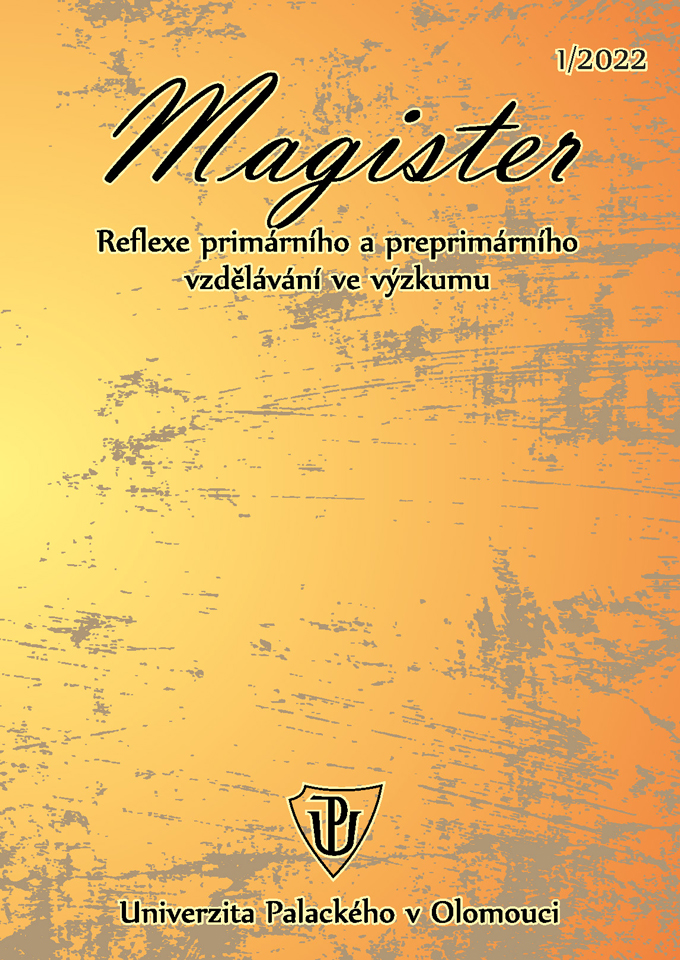Factors leading to quality inclusive education
DOI:
https://doi.org/10.5507/magister.2022.148Keywords:
Inclusive school, Quality of education, Primary educationAbstract
The paper presents the results of a content analysis looking for examples of good practice in inclusive schools, specifically looking for factors that increase the quality of inclusive education in schools. The main method chosen was the aforementioned content analysis of available foreign research investigations. The documents for analysis were defined by the data set - type of source documents, content analysed and time period. Based on this specification, 12 research investigations were selected and further analysed by axial coding. The results show a significant agreement of the selected researches in the following areas: school leadership - qualified and knowledgeable principal; building community and school culture; school communication with family and professionals; developing a favorable pro-inclusive environment; pro-inclusive attitude of teachers; developing and maintaining inclusive values; managing the educational process. According to selected research, these areas have a major impact on the quality of inclusive education on a global scale.
References
Ainscow, M. (2020). Promoting inclusion and equity in education: lessons from international experiences. Nordic Journal of Studies in Educational Policy, 6 (1), 7–16.
Billingsley, B., & DeMatthews, D. (2018). Leadership for Effective Inclusive Schools: Considerations for Preparation and Reform. Australasian Journal of Special and Inclusive Education, 42(01), 65–81.
Brown, C. S. (2019). The Importance, and the Challenges, to Ensuring an Inclusive School Climate. Educational Psychologist, 54(4), 322–330.
Buli-Holmberg, J. & Sujathamalini, J. (2016). Effective Practice in Inclusive and Special Needs Education, International Journal of Special Education, 31 (1), 119-134.
Carley, K. (1993). Coding Choices for Textual Analysis: A Comparison of Content Analysis and Map Analysis. Sociological Methodology, 23, 75-126.
DeMatthews, D. E., Serafini, A., & Watson, T. N. (2020). Leading Inclusive Schools: Principal Perceptions, Practices, and Challenges to Meaningful Change. Educational Administration Quarterly, 1 – 46.
Dewanti, S. R., & Novitasari, Z. (2019). The Success Story From Inclusive School: A Case Study. Advances in Social Science, Education and Humanities Research, 462, 291 – 293.
Forlin, C. (2010). Teacher Education for Inclusion: Changing Paradigms and Innovative Approaches. Routledge.
Malatji, J. M. (2018). The role of school-community partnership in promoting inclusive and quality education in schools. Journal of Educational Studies, 17 (2), 72 – 86.
Muñoz, Y., & Márquez, C. (2021). Supporting schools in their journey to inclusive education: review of guides and tools. Support for Learning, 36(1), 20–42.
OECD. (2012). Equity and quality in education: Supporting disadvantaged students and schools. Crossref.
Osiname, A. T. (2017). Utilizing the Critical Inclusive Praxis: The voyage of five selected school principals in building inclusive school cultures. Improving Schools, 21(1), 63–83.
Purbaningrum, E. (2017) - Leadership Attitude through The Acts of Planning in The Management and Development of Inclusive School. Advances in Social Science, Education and Humanities Research, 173, 97 – 100.
Reddy G.L. (2006). Children with Disabilities: Awareness, attitude and competencies of Teachers, Discovery Publishing House.
Saloviita, T. (2020). Attitudes of Teachers Towards Inclusive Education in Finland. Scandinavian Journal of Educational Research, 64 (2), 270 – 282.
Scherer, H. (2004). Úvod do metody obsahové analýzy. In W. Schulz (Ed.), Analýza obsahu mediálních sdělení (s. 29 – 50). Karolinum.
Smith, Ch. P. (1992). Motivation and Personality: handbook of thematic content analysis. Cambridge University Press.
Spilková, V. (2005). Proměny primárního vzdělávání v ČR. Portál.
UNESCO. (2015). Incheon declaration and framework for action for the implementation of sustainable development goal 4. Crossref.
Valdivieso, P. (2020). School Leaders and Inclusive Education in Peru: A Case Study of Principal Leadership in an Effective Inclusive School. International Journal of Innovative Business Strategies, 6 (2), 453 – 461.
Downloads
Published
Issue
Section
License

This work is licensed under a Creative Commons Attribution-ShareAlike 4.0 International License.


